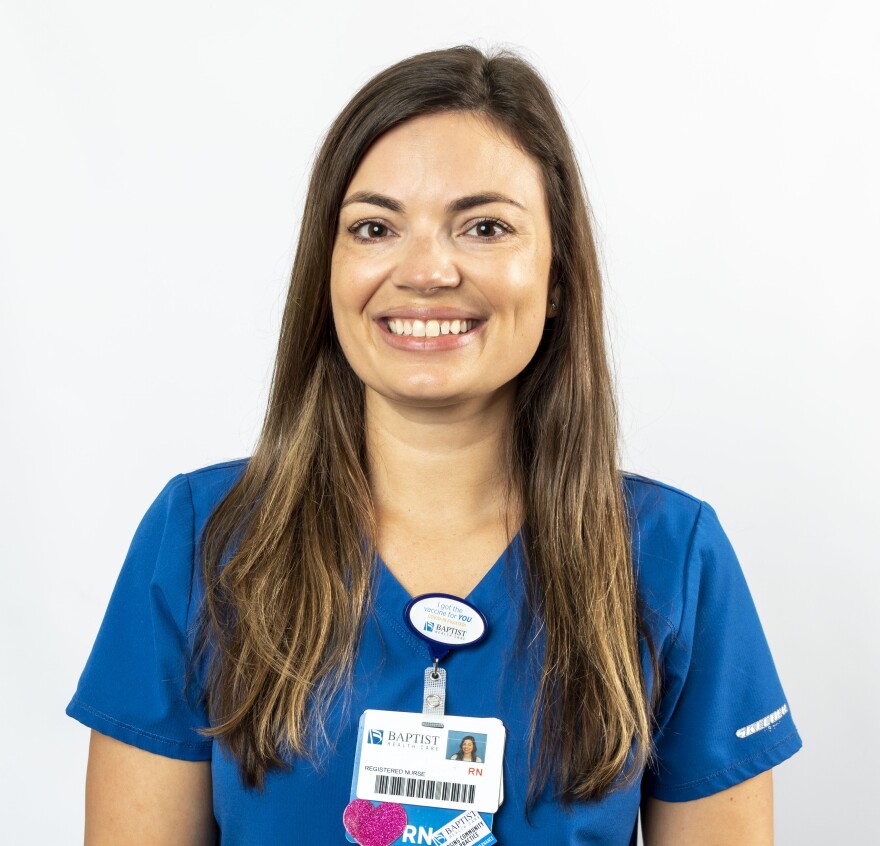Baptist Health Care nurse Jamie Leigh Gunter is one of the troops on the front lines of the pandemic in Pensacola – and was also a patient herself.
Gunter earned her Bachelor’s degree in nursing from the University of South Alabama, and has been at Baptist Health Care for about a year and a half. She began treating COVID cases nine months ago.
“In the beginning it wasn’t really big; we didn’t have a lot of patients,” said Gunter. “But all of us were a little scared, we didn’t know what to expect or what to deal with. But we took it day-by-day and just kind of went with it. By the summer, it obviously go t a lot worse.”
It was a whole new ballgame, says Gunter, to the point where, at the beginning, there was little if any specialized training in handling coronavirus patients.
“We’re trained in a lot of different things – respiratory function was one of the main things we were looking at,” Gunter said. “We’ve learned as we’ve gone [along], and learning how to properly don and doff our [Personal Protective Equipment]. Now we’re using an N-95 [mask], which we had never normally done before. So that was definitely something that was new.”
While doctors and nurses had to make it up as they went along at first, Gunter says there emerged a number of patterns in different patients that provided a COVID blueprint of sorts.
“Sometimes I have patients that come in that were having completely different symptoms than I had seen before,” said Gunter. “And as far as just my daily assessment of patients, I kind of found different ways to monitor my patients and look for certain signs and symptoms that show they might be getting better, [or] they’re getting worse, and be able to relay that to the doctors.”
Prior to becoming a nurse, Gunter was a social worker at a number of mental health facilities, including the Lakeview Center. That experience, she says, is a major advantage in dealing with the virus.
“It’s kind of being able to understand their history, what their home life is like, and how they’ll be able to recover when they go home – I’m always thinking about those things for sure,” Gunter said. “We have great case managers on my floor that really work with that as well.”
During her time in the COVID ward, Gunter says the constant pressure of one life-and-death case after another is wearing down her fellow nurses, along with doctors, and support personnel.

“We’ve tried to – just in general on our floor – to make sure we’re there for each other, come up with different ways that we can de-stress and get away from it for just a little bit,” said Gunter. “I think that’s the hardest part; it’s always on the news, then we’re walking into work every day and something new, or we’re seeing more cases.”
After working for several months on the COVID-19 floor at Baptist, Gunter said she was proud that she was able to avoid contracting the virus. She received the vaccine and then tested positive.
“I actually tested positive a few days later; I believe that I had possibly gotten it right before my vaccine,” Gunter said. “I lost my taste for a few days; I lost my smell for almost two weeks. And then – probably on the seventh or eighth day, I really started getting some shortness of breath and severe fatigue. It definitely took a toll on me; I definitely had a full two weeks of symptoms.”
One of Gunter’s concerns is that the pandemic is such a major part of the news, all COVID all the time, which non-health care workers don’t see what she and her colleagues actually do.
“I can’t even imagine the number of patients that I’ve had just myself in these nine months; it’s kind of crazy to think back on, because that’s all I’ve dealt with is COVID,” said Gunter. “People when they get in the hospital they’re scared; it’s a scary thing, so it’s definitely been difficult to see this play out.”
Over the past year, numerous people – doctors, health experts, politicians, celebrities, ordinary people and others – have admonished everyone to mask up, wash hands and social distance. Joining those voices is nurse Jamie Gunter – who’s on the front lines and has been, in football parlance, on both sides of the ball.
“We are just as tired of COVID as the public is; I look forward to the day where I don’t have to put on a gown, an N-95, a face shield – put on the whole thing,” Gunter said. “It will go away one day, but just for now just bear with it and keep protecting yourself. But mostly to protect others.”

